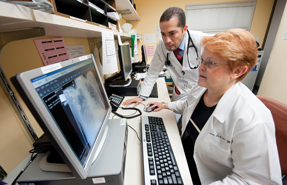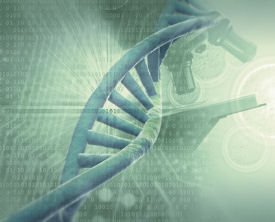College Fellow is Navy's new surgeon general
Matthew L. Nathan, MD, FACP, oversees medicine for the Navy. Yes, his personal heroes are Vice Admiral James Stockdale and Teddy Roosevelt, but to make his way through school, he was a magician and musician.
Matthew L. Nathan, MD, FACP

Occupation: Vice Admiral, Surgeon General and Chief, Bureau of Medicine and Surgery, U.S. Navy.
Current residence: Bethesda, Md.
Hometown: Napa, Calif.
Family: My wife is born and bred in West Virginia. She recently retired as a medical service corps officer in the Navy. We have one daughter and she is 14.
Training
Medical school: The Medical College of Georgia.
Residency: Internal medicine, University of South Florida.
Something I wish I'd learned in medical school: Insight into how our patients make their choices. I wish at an earlier age I had had a better understanding of how to influence those people who seek our help and create incentives for them to change their lives.
Career
I became an internist because: There were two specialties that interested me a great deal in medical school: general surgery and internal medicine. I settled on internal medicine for two reasons. It was the only specialty I saw which was charged with providing wellness and preventive care while also providing care to some of the most complex and ill patients in the world. The other reason is that I was working on cars so much that I would be scrubbing for hours if I were to be a surgeon.
First job: Working as an auto-shop detailer for car agencies. My first paid job in medicine was moonlighting in emergency rooms and urgent care clinics. My first job as an internist was the Navy sending me to Guantanamo Bay to be the sole internal medicine specialist there.
Most meaningful professional accomplishment: It would have to be being named the surgeon general of the Navy.
Most rewarding aspect of my job: Caring for the men and the women who go to war, our wounded warriors and their families.
Future goals: To increase access to care and awareness of disease prevention. I hope to use my position to try to leverage the intersection of evolving technologies in health care informatics with population health. I think there's a lot we can use, social media and health care informatics, as well as the electronic medical record. If we have a teenager who starts smoking today, somehow the system has failed.
Hardest medical lesson learned: Of the interventions and medical practices that we use today, some of them invariably will be proven to be wrong in the future. Without knowing it, there are some things we are doing today which will be shown to either be of no benefit or actually disadvantageous to the patient. There is obviously a balance between trying new versus proven treatments. It is frustrating that we can't know those things ahead of time.
Personal
Personal heroes: Vice Admiral James Stockdale. He was a Medal of Honor winner and a prisoner of war during the Vietnam War. He was an aviator who was shot down and captured. His strength, courage, leadership and his spirit in persevering were exemplary. Also Teddy Roosevelt, who I think epitomized America's values of democracy, personal conviction, and creating engagement around the world and influencing other nations.
Pet peeves: First, meetings that either go too long or do not result in deliverables or productive outcomes. The second would be physicians who rely too much on technology and instrumentation and don't nurture their diagnostic acumen and instincts to optimize the interfaces, expenses and sometimes, resulting complications and exposures to the patient.
Favorite ways to spend free time: Traveling with family, teaching my daughter the guitar, and rebuilding and restoring older automobiles.
Favorite author or poet: William Faulkner. Having my family's heritage in the South and having trained there, I really enjoy his writing.
Favorite poet: A.E. Housman. I always knew of him, but when the Navy sent me to London to work for a few years I had the opportunity to learn much more about him.
Most recent books read: “The Litigators” by John Grisham and “Thinking Fast and Slow” by Daniel Kahneman.
Most meaningful non-medical accomplishment: I'm proud of the role that I played, along with many others, in keeping health care going and supporting our command in Pensacola and the Gulf Coast when hurricanes came through. We were hit during my tour with hurricanes Ivan, Dennis and Katrina. As a result of those efforts, I received the American Hospital Association's “Excellence in Leadership” award for the Federal Sector; however, in reality I have succeeded in large part due to my family and amazing colleagues along the way who have always been there for me.
Item I can't live without: My wife and daughter would say my BlackBerry, and I would say it's them.
Most surprising thing about me: To help me make my way through school, I was both a semi-professional magician and a musician (guitarist).
A regret: I regret that I didn't start reading non-science literature at an earlier age. I've come to enjoy it very much and realized that it adds dimension to all of us. It adds to our perspectives.
If I weren't a physician, I would be: An unemployed musician.





